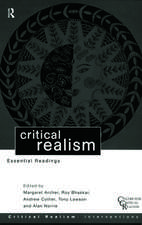Plato and Levinas: The Ambiguous Out-Side of Ethics
Autor Tanja Staehleren Limba Engleză Paperback – 27 feb 2015
Levinas's approach to ethics begins in the encounter with the other as the most basic experience of responsibility. He acknowledges the necessity to move beyond this initial, dyadic encounter, but has problems extending his approach to a larger dimension, such as community. To shed light on this dilemma, Tanja Staehler examines broader dimensions which are linked to the political realm, and the problems they pose for ethics.
Staehler demonstrates that both Plato and Levinas come to identify three realms as ambiguous: the erotic, the artistic, and the political. In each case, there is a precarious position in relation to ethics. However, neither Plato nor Levinas explores ambiguity in itself. Staehler argues that these ambiguous dimensions can contribute to revealing the Other’s vulnerability without diminishing the fundamental role of unambiguous ethical responsibility.
| Toate formatele și edițiile | Preț | Express |
|---|---|---|
| Paperback (1) | 487.37 lei 6-8 săpt. | |
| Taylor & Francis – 27 feb 2015 | 487.37 lei 6-8 săpt. | |
| Hardback (1) | 1221.12 lei 6-8 săpt. | |
| Taylor & Francis – 13 aug 2009 | 1221.12 lei 6-8 săpt. |
Preț: 487.37 lei
Nou
Puncte Express: 731
Preț estimativ în valută:
93.29€ • 101.37$ • 78.41£
93.29€ • 101.37$ • 78.41£
Carte tipărită la comandă
Livrare economică 22 aprilie-06 mai
Preluare comenzi: 021 569.72.76
Specificații
ISBN-13: 9781138870574
ISBN-10: 1138870579
Pagini: 296
Dimensiuni: 152 x 229 x 16 mm
Greutate: 0.41 kg
Ediția:1
Editura: Taylor & Francis
Colecția Routledge
Locul publicării:Oxford, United Kingdom
ISBN-10: 1138870579
Pagini: 296
Dimensiuni: 152 x 229 x 16 mm
Greutate: 0.41 kg
Ediția:1
Editura: Taylor & Francis
Colecția Routledge
Locul publicării:Oxford, United Kingdom
Public țintă
PostgraduateNotă biografică
Dr. Tanja Staehler is Senior Lecturer in Philosophy at the University of Sussex.
Cuprins
Introduction
a) The Central Question b) Plato’s Phaedrus c) Levinas’s Two Main Works d) Levinas on Plato e) Methodological Remarks f) Before CulturePart I: The Self Chapter 1: Preliminary Reflections on the Self
a) Interiority and the Myth of Gyges b) Otherness in the SameChapter 2: Dimensions of Corporeality
a) Levinas and the Body as Vulnerability
b) The Body in Plato’s PhaedrusChapter 3: Enjoyment or Suffering? Modes of Sensibility
a) The permanent truth of hedonist moralities
b) Pleasure, Pain, and VulnerabilityPart II: The Other Chapter 4: Origins of Speech
a) Speech as Apology
b) Socratic and Levinasian TeachingChapter 5: The Ambiguity of Eros
a) Levinas about Eros between Being and Non-Being
b) Plato on Beauty and Wings
c) The Place of ErosChapter 6: The Ethical Relationship
a) The Paradox of Ethical Resistance b) An Infinite Responsibility c) Getting under the SkinPart III: The Others Chapter 7: The Universality of the Good
a) Levinas and Universal Humanism b) Plato and the Good beyond BeingChapter 8: Communities, Politics, Laws
a) Plato on the Advantages and Disadvantages of Law b) Levinas and the Political CalculusPart IV: Historical-Cultural Worlds Chapter 9: The Critique of Writing
a) Writing Versus Speech b) The Saying and the SaidChapter 10: The Ambiguity of the Aesthetic
a) Images and Shadows b) The Irresponsibility of Art c) The Work and TyrannyChapter 11: History and Culture
a) Between Past and Future b) Levinas and the Stranger c) Philosophers and Strangers in PlatoChapter 12: Concluding Remarks on Ethics and Ambiguity
a) Univocal Ethics? b) Ambiguity in de Beauvoir, Merleau-Ponty, and Levinas c) Attempting a Genealogy of Ambiguity d) Plato’s Contribution
Descriere
Like Plato, Emmanuel Levinas believed that ethics was the most fundamental philosophical discipline. Levinas's approach to ethics begins in the encounter with the other as the most basic experience of responsibility. He acknowledges the necessity to move beyond this initial, dyadic encounter, but has problems extending his approach to a larger dimension, such as community. To shed light on this dilemma, Tanja Staehler examines broader dimensions which are linked to the political realm, and the problems they pose for ethics. Staehler demonstrates that both Plato and Levinas come to identify three realms as ambiguous: the erotic, the artistic, and the political. Staehler argues that these ambiguous dimensions can contribute to revealing the Other’s vulnerability without diminishing the fundamental role of unambiguous ethical responsibility.


























